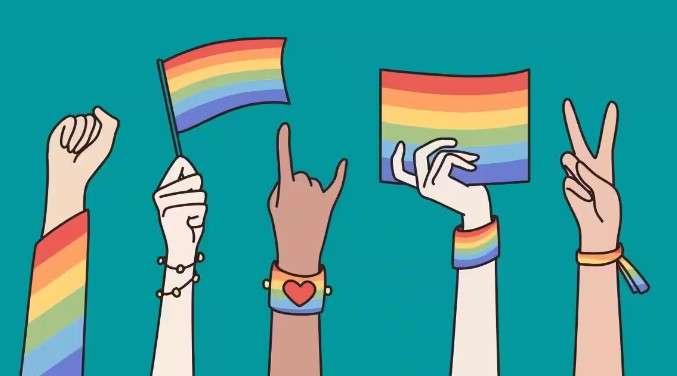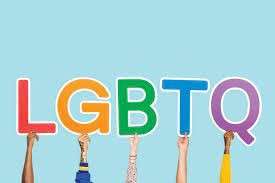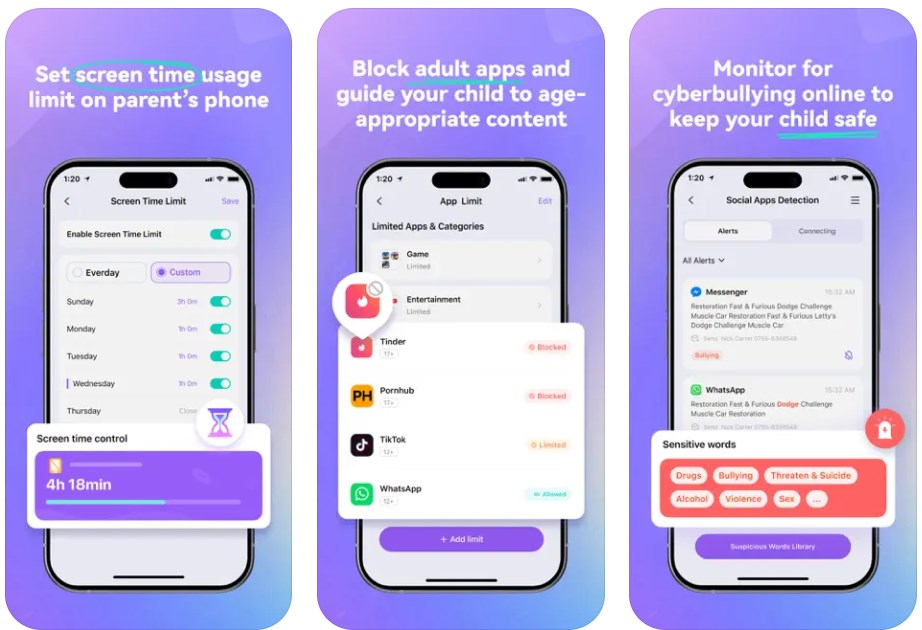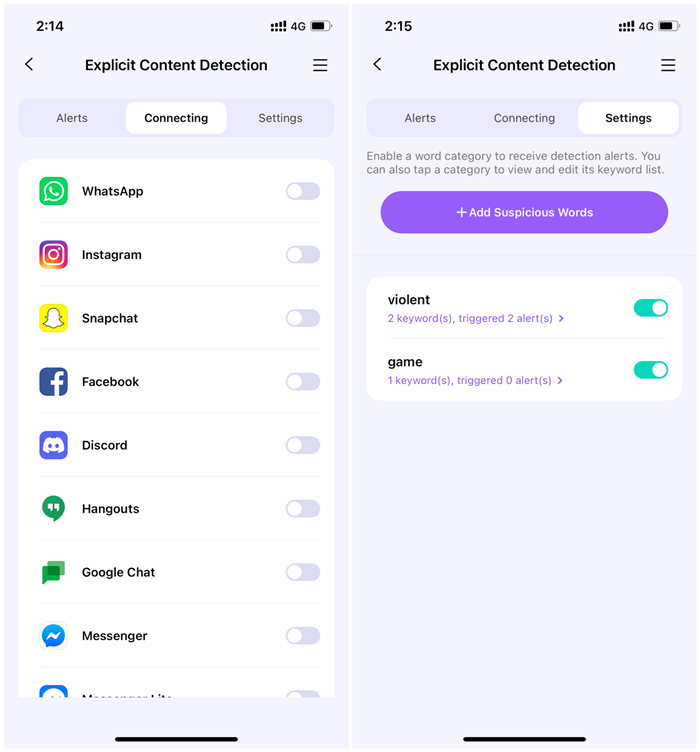
In recent years, the LGBTQ community has become increasingly visible and vocal. Discussions around LGBTQ rights and issues are becoming more commonplace. However, for those not part of the community, there can still be confusion and uncertainty around what the term "LGBTQ" actually means.
This article will explore in detail what LGBTQ means. It'll break down each letter to better understand the diverse and complex identities under this umbrella term. Sexual orientation, gender identity, and gender expression are all defined in various ways. The article will also introduce a useful application. The tool can protect your LGBTQ family or friends from harmful online information.
Table of Content
LGBTQ: Meaning of Each Letter
"LGBTQ" is an acronym representing a diverse group of individuals. These people have different sexual orientations and gender identities. Each letter in the acronym stands for a distinct aspect of identity. Understanding what each letter represents is crucial in promoting inclusivity and acceptance for individuals who identify with these groups. Here is a breakdown of what each letter means:

L: Lesbian
The first letter in the acronym "L" stands for lesbian. This term refers to a woman who is sexually and romantically attracted to other women. Lesbians can be cisgender or transgender and come from all walks of life.
G: Gay
The letter "G" stands for gay. It refers to men who are attracted to other men. Like lesbians, gay men can be cisgender or transgender. They are also diverse in terms of their backgrounds and experiences.
B: Bisexual
The letter "B" stands for bisexual, which refers to individuals attracted to people of their gender and another gender. Bisexuality is not binary and can include attraction to non-binary individuals as well.
T: Transgender
The letter "T" stands for transgender. These individuals' gender identity does not align with the sex they were assigned at birth. Transgender individuals may identify as male, female, non-binary, or genderqueer, among other identities.
Q: Queer/Questioning
The letter "Q" can stand for either queer or questioning. Queer is an umbrella term for individuals not identifying as heterosexual or cisgender. Questioning, on the other hand, refers to individuals exploring their sexual or gender identity. That means they may not clearly understand where they fit on the spectrum.
In conclusion, the LGBTQ acronym represents diverse individuals with unique identities and experiences.
What Does the "+" Mean in LGBTQ+ and Why Does It Matter?
You might have stumbled upon the term LGBTQ+ and wondered what it stands for. The plus sign "+" in LGBTQ+ signifies that the acronym is not exhaustive. It includes all other gender identities and sexual orientations not explicitly represented in the acronym. It is an important symbol of inclusivity and demonstrates the ever-evolving nature of the LGBTQ+ community.
The "+" also acknowledges the existence of intersectional identities and the struggles faced by marginalized groups. It is a reminder that everyone deserves respect, acceptance, and support regardless of identity.
The Importance of LGBTQ+ Representation
LGBTQ+ representation in media, politics, and other areas is crucial for creating a more inclusive and accepting society. Representation matters because it helps challenge stereotypes. It also increases visibility for marginalized communities, leading to greater acceptance and understanding.
Inclusivity
When LGBTQ+ individuals see themselves represented in media and other public spaces, it helps to normalize their experiences and identities. It sends a message that they are not alone and that their experiences are valid and deserving of respect. Some young people struggle with their identities. They don't have role models or supportive communities around them. The message is crucial for them.
Representation also helps to challenge harmful stereotypes and biases. Media portrays LGBTQ+ individuals in diverse and complex ways. Therefore, it helps break down simplistic and harmful stereotypes perpetuating discrimination and prejudice. This point can also help to increase empathy and understanding among individuals who may not have direct experience with LGBTQ+ issues.

Visibility
LGBTQ+ representation increases visibility for marginalized communities and highlights their issues. Increasing their public profile can bolster a person's sense of self-affirmation. Representation elevates the voices and experiences of LGBTQ+ individuals. It can bring attention to discrimination, harassment, and unequal treatment. Hence, representation can spark meaningful conversations and advocacy efforts to address these issues and create a more equitable society.
LGBTQ+ representation matters because it helps to create a more inclusive and accepting society. It challenges harmful stereotypes and biases and increases visibility for marginalized communities. People must continue to work towards more excellent representation and visibility for LGBTQ+ individuals and other marginalized groups. Thereby, everyone can live their lives with dignity and respect.
Related Terms That You Should Know
You might also come across the following terminology when learning about the LGBTQ+ community:
- Asexual: To be asexual, or "ace," is to lack sexual attraction. However, one may still feel romantic attraction to others.
- Cisgender: The word "cisgender" describes people whose gender identity matches the gender assigned to them at birth.
- Intersex: "Intersex" describes people who do not fit neatly into the male or female gender categories at birth.
- Nonbinary: A nonbinary person does not identify as either a woman or a man exclusively.
- Gender Non-conforming: A person who does not conform to the binary of male and female or female and male is considered gender non-conforming.
With that said, gender identity refers to an individual's subjective experience of their gender, be it female, male, or non-binary. Gender expression and the sex assigned at birth are not always indicative of a person's true gender identity. Gender is not the same as sex, and that distinction needs to be made clear. While a person's genetics determines sex, gender is shaped by their upbringing and society.
Protect Your Kids From Cyberbullying Using Wondershare FamiSafe
Despite being at the forefront of educational communities for years, how to prevent bullying in schools continues to be one of the most pressing concerns everywhere. According to the statistics by American SPCC, 70.6% of children get bullied in their school, and around 55.2% of LGBTQ students get cyberbullied during their education. Hence, more and more parents look for the best ways to protect their children from experiencing such a state.
As parents, protecting their kids with modern technology has been a useful trend nowadays. That's why many developers have created parental control apps. The various tools assist with the challenges of raising children. They can safeguard children from cyberbullying and other forms of bullying at school.

Among the many available apps on the market, Wondershare FamiSafe is the world's leading parental control app. It allows you to monitor your children's digital device usage. FamiSafe easily lets you:
- Set up geofences to receive custom alerts and track the device's location.
- Set a screen time limit or timetable to assist children in developing good digital habits.
- Monitor 10 popular social media platforms for questionable text or sexual content.
- Filter websites with inappropriate content automatically.
- Block games or social media apps to keep your children from becoming addicted to them.
- Notify you when questionable images are discovered in your kid's album.
FamiSafe has a feature called Explicit Content Detection. The Function greatly helps parents protect their kids from bullying. Due to the impossibility of constantly monitoring your child's SMS texts, FamiSafe does the heavy lifting for you. The program utilizes scanning technology to go through your child's SMS texts as they are sent and received, giving you peace of mind.

To make the best decisions for your child's safety, you need to know what's always going on. The software can identify a word that could be used in a bullying context, such as a swear word or a word to offend someone. In that case, you will receive a notification about the messages if the
This function works with Android smartphones. It allows you to keep tabs on children's text messages, Facebook Messenger, Facebook Messenger Lite, Kik, WhatsApp, Gmail, and YouTube. If your child has an iOS device, you can keep tabs on what they're watching on YouTube.
Conclusion
Understanding what LGBTQ means and what it stands for is essential in promoting inclusivity and understanding. It encourages respect for individuals with different sexual orientations and gender identities. However, it's undeniable that the LGBTQ community still experiences discrimination and bullying, especially online.
As parents, you surely wouldn't want to know that your kid suffers from such treatment. To protect them from cyberbullying, you must turn to modern technology. FamiSafe, the most reliable parental control app, is packed with many useful features that will help you safeguard your kids.
